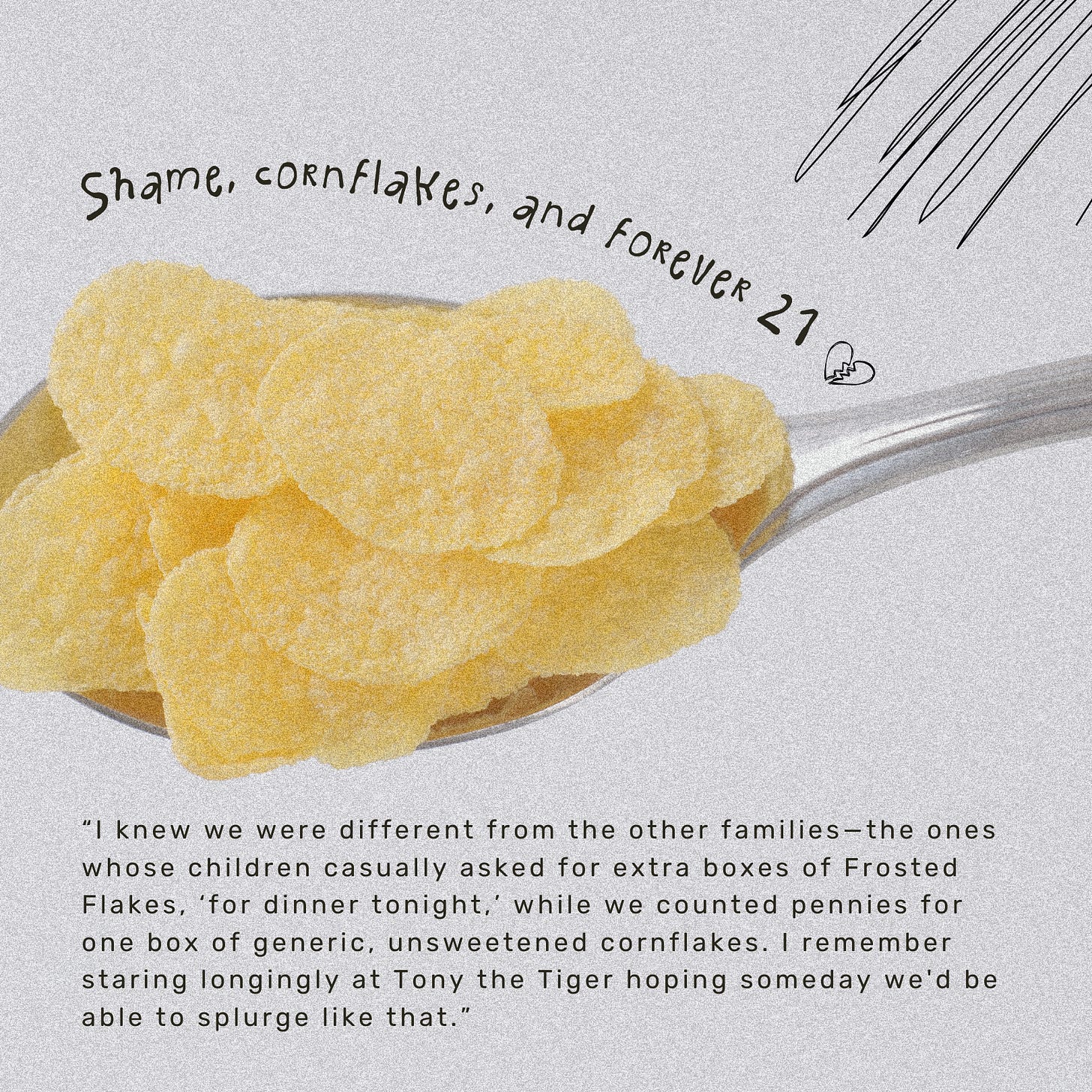I grew up really poor.
The kind of poor where potatoes and corn flakes were the only things we could afford to eat. I remember the heat that crept up my neck when my mom handed over food stamps at the grocery store to pay for our groceries. Back then, they weren't plastic EBT cards that could be mistaken as any debit or credit card, but fragile slips of paper, loud in their meaning. I wanted to melt into the floor like the Wicked Witch of the West when water was thrown at her, but instead, I disappeared into the long folds of my mom's skirt.
I knew we were different from the other families—the ones whose children casually asked for extra boxes of Frosted Flakes, "for dinner tonight," while we counted pennies for one box of generic, unsweetened corn flakes. I remember staring longingly at Tony the Tiger hoping someday we'd be able to splurge like that. Our indulgence came in much smaller ways—extra lentils, carefully rationed, that my sister were allowed to season ourselves. It was practical. And to us, it was fun!
Naturally, my family also thrifted almost all our clothes. At the time, it wasn't trendy like it is now, and fashion was more narrow and less forgiving. Finding something cool at Goodwill was a rare feat.
I distinctly remember my mom picking up my sister and me from my friend Alyssa's house after school. As Alyssa's mom chatted with mine I think she must have asked where she got her shirt because my mom proudly said, "I got it at the thrift store!" That familiar feeling of wanting to melt into the floor returned, and I wanted to die.
Alyssa's family seemed to have everything: a plethora of snacks in the pantry and clothes from stores like Wet Seal and Forever 21 (yes, back then, that was luxury to me).
It feels silly now to have been so self-conscious now, there was nothing to be ashamed of. I was fed and clothed. Looking back, I realize that growing up without much didn't just make me resilient—it made me creative as hell.
Those ill-fitting thrift store clothes? I learned how to sew to make them fit. At a young age, I learned how to put an outfit together based on proportion, color, and cut instead of relying on trends. Those lentil dinners? My sister and I became great cooks. With no pre-made foods at home, we had to figure out how to make meals from whatever was around. A box of nuts, wilted greens, and a shriveled carrot? You better believe we made something out of it.
But I remember that burning shame—at Alyssa's house and the grocery store—and it still pops up for me every once in a while.
The thing about shame is that it does the opposite of what we need when we're feeling vulnerable. What we crave in those moments is acceptance. But when shame wins, we assume rejection is inevitable, so we hide. And the truth is, we don't really know if rejection is coming. Maybe it will, but maybe… it won't.
Brené Brown, a shame researcher, said, "If you put shame in a petri dish, it needs three ingredients to grow exponentially: secrecy, silence, and judgment. If you put the same amount of shame in the petri dish and douse it with empathy, it can't survive."
To dissolve shame, we have to turn toward the people who offer empathy. We can't turn away.
As I navigate starting over, I know shame will creep in. It has already… For all intents and purposes, I've made some colossal failures. Sure, starting fresh is exciting, and I know not everyone gets the chance to reinvent themselves like I do now.
But beneath the excitement is that pit in my stomach that urges me to hide in the folds of my mother's skirt because I've essentially failed at a job and a marriage and even neglected the one thing I love most—music.
Sharing this process of starting over is not only me turning toward you, hoping to find a few empathetic voices, but a hope that a little courage seeps through the screen and reminds you to turn toward, not away.
A while ago now, I wrote a song about just that. I hope you enjoy it.





Hard relate, friend. Thank you for this. Love you.
ah that life sounds kinda familiar. in a different way, but familiar.
and those hard broke people rules.. they are haunting.